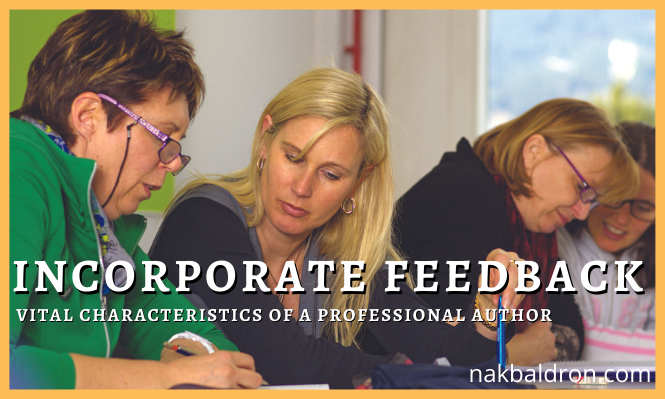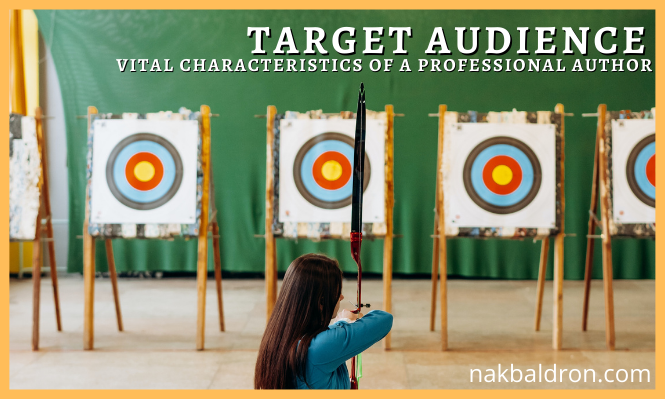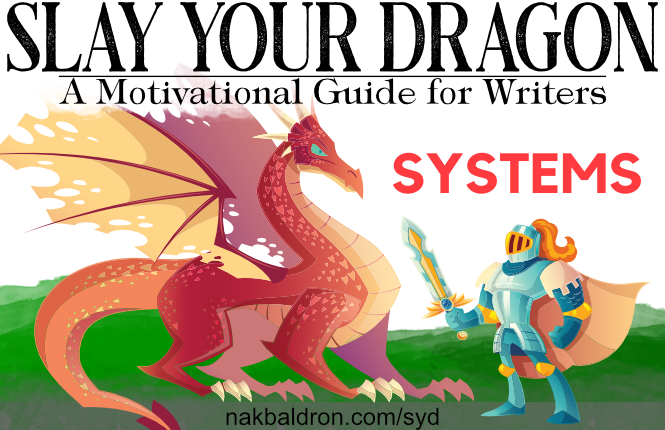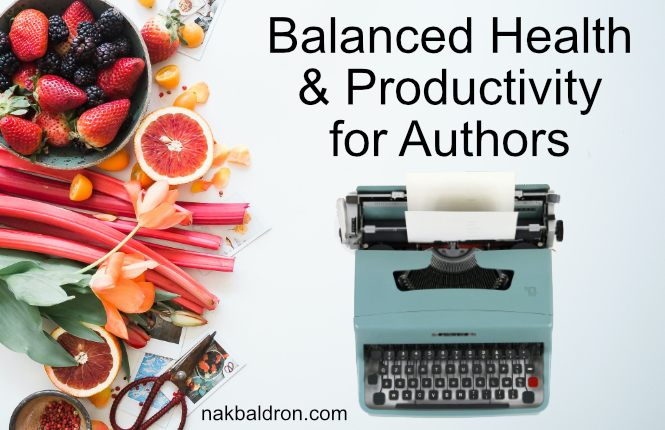The ability to take and incorporate feedback is an essential aspect of being a professional author. Feedback is valuable information and perspective that can help authors improve their work and enhance its clarity, coherence, and overall effectiveness.
Taking feedback involves being open and receptive to critiques and suggestions from others, and being willing to consider and evaluate them objectively. It requires a willingness to listen and learn, and to be open to new ideas and perspectives.
Incorporating feedback involves using the insights and suggestions provided by others to make changes and improvements to the work. This can involve making substantive changes to the content or structure of the work, as well as making more minor edits to improve clarity or flow.
The ability to take and incorporate feedback requires a willingness to be vulnerable and to accept constructive criticism, as well as the ability to self-assess and make changes as needed. It is an essential skill for professional authors, and one that requires practice and development.
Beta readers:
Beta readers are an important part of the writing process for many authors. They are individuals who read and provide feedback on a work of fiction before it is published. Beta readers are typically other writers or avid readers who are willing to offer their insights and perspective on a story, its characters, plot, and writing style.
One of the main benefits of using beta readers is that they can offer a fresh perspective on your work. They have not been involved in the creative process and can therefore provide an unbiased view of the story. This can be especially useful if you have been working on a project for a long time and may have become too close to it to see it objectively. Beta readers can help identify any plot holes, inconsistencies, or areas where the writing may be unclear.
In addition to providing feedback on the overall structure and plot of the story, beta readers can also offer insights on the characters. They can help you understand how well your characters are developed and whether they are relatable and believable. Beta readers can also provide feedback on your writing style, including whether your dialogue is natural and whether your prose is engaging and flows well.
Using beta readers can also be a great way to get a sense of whether your work will appeal to your intended audience. Beta readers can provide valuable feedback on whether the story resonates with them and whether they would be interested in reading more of your work. This can be especially useful if you are writing for a specific genre or age group, as beta readers can help you understand whether your work fits with the expectations of those readers.
The process works best when you provide guided questions on a chapter-by-chapter basis.
- What was your overall impression of the chapter?
- Were there any parts of the chapter that were particularly confusing or unclear?
- Did you find the chapter engaging, or were there any parts that felt slow or repetitive?
- How did you feel about the characters in this chapter? Were they well-developed and believable?
- Were there any plot points or twists that felt unexpected or surprising?
- Did the chapter effectively advance the overall plot of the story?
- Were there any parts of the chapter that felt unnecessary or could be cut?
- Was the pacing of the chapter effective, or were there any parts that felt too slow or rushed?
- Did the chapter effectively convey the tone and mood of the story?
- Were there any issues with grammar, spelling, or punctuation that you noticed?
- Did the chapter leave you wanting to read more, or were you satisfied with the ending?
- Do you have any other comments or suggestions for improvement?
Try to limit your questions to three. If you have a large team, you can divide them into four sections and give each team three questions.
Overall, beta readers can provide valuable insights and perspective on your work before it is published. Their feedback can help you identify any weaknesses in your story and improve the overall quality of your writing. It is important to remember that beta reader feedback is just one piece of the puzzle, and you should not feel obligated to make all of the suggested changes. However, by taking the time to consider the feedback of beta readers, you can improve your work and create a more polished and engaging story.
Writing groups:
Writing groups are a great resource for writers looking to improve their skills and understanding of the writing process, as well as the unique challenges that come with being an author. These groups typically consist of a small group of writers who meet regularly to discuss a wide range of topics related to writing and the writing life.
One of the main benefits of writing groups is that they provide an opportunity to get feedback and support from other writers who understand the unique challenges of the writing life. These writers can offer valuable insights and suggestions on topics such as marketing, routines, software, and more. Writing groups can also be a great way to learn from the experiences of other writers and to share your own experiences and challenges.
In addition to providing feedback and support, writing groups can also be a great way to build a sense of community and accountability. It can be isolating to work on a writing project on your own, and having a group of like-minded individuals to share your work with and discuss your writing goals can be incredibly helpful. Writing groups can also provide a sense of accountability, this can be a great motivator for writers who may be struggling to stay motivated or make progress on their projects.
It is important to find a writing group that is a good fit for you and your genre. It is also important to remember that writing groups should be a safe and supportive environment where writers can share their work and experiences without fear of judgment or criticism.
Overall, joining a writing group can be a valuable resource for writers looking to improve their skills and understanding of the writing process, as well as the unique challenges of being an author. These groups can provide a supportive and constructive environment for discussing and improving your writing, marketing, routines, software, and more. They differ from critique groups in that they usually do not focus on the nuts and bolts of writing, but rather on the larger issues and challenges faced by writers.
Online writing communities:
Writing groups that have migrated online instead of in person. For some this is superior, while others still desire in-person meetings. However, they’re not mutually exclusive. Many online groups will also meet in person, and you can always make friendships with authors in your area though the online groups and meet up in person, if you prefer face to face.
Critique Groups:
Critiquing other authors’ novels can be a valuable way to improve your own writing skills. By analyzing and evaluating the strengths and weaknesses of other authors’ works, you can gain insight into what makes a novel effective and engaging, and how to apply these principles to your own writing.
By joining an author critique group, you can also gain insight into your own strengths and weaknesses as a writer. By reading and analyzing the work of your peers, you can identify areas of your own writing that may be in need of improvement, and focus your efforts on those areas. This can be especially helpful if you’re feeling stuck or unsure of where to go next in your writing project.
By analyzing the plot structure of other novels, you can learn how to create a clear and compelling storyline that guides the reader from beginning to end. You can also learn how to effectively use plot points to mark key moments in the story, and how to create a satisfying resolution.
By reading and analyzing the characters in other novels, you can learn how to create fully-realized, three-dimensional characters with their own flaws, desires, and motivations. You can also learn how to create a rich character web, or the relationships between the various characters in a story and how they interact and affect one another.
Additionally, critiquing other authors’ novels can help you to identify strengths and weaknesses in your own writing. By analyzing the work of other writers, you can gain a better understanding of what elements are working well in your own writing, and what areas may need improvement. This can help you to focus your efforts on the areas that need the most work, and to continually strive to improve your writing.
Here are a few ways that critiquing other authors’ novels can help improve your own writing skills:
Identify strengths and weaknesses: By analyzing the elements of a novel, such as plot, character development, setting, and dialogue, you can identify the strengths and weaknesses of the work and consider how you might incorporate these elements into your own writing.
Learn from other authors’ successes and mistakes: By reading and evaluating a wide range of novels, you can learn from other authors’ successes and mistakes, and apply this knowledge to your own writing.
Enhance your analytical and critical thinking skills: Critiquing other authors’ novels requires careful analysis and evaluation of the work, which can help enhance your analytical and critical thinking skills.
Develop a more critical eye: By regularly critiquing other authors’ novels, you can develop a more critical eye and be more attuned to the elements that make a novel effective and engaging.
Furthermore, author critique groups can provide a sense of community and support for writers, which can be especially helpful for those who are working on their own. Writing can be a lonely and isolating pursuit, and having a group of supportive peers who are also working towards similar goals can provide motivation and encouragement.
Author critique groups can be a valuable educational resource for writers of all levels, from beginners to more experienced authors. By providing a forum for writers to share their work and receive feedback from their peers, these groups can help writers to improve their craft, identify their strengths and weaknesses, and gain a sense of community and support.
As a writer, it can be easy to feel isolated and alone in the creative process. Working on a book or other writing project can be a long and often solitary pursuit, and it can be easy to feel like you’re in it alone. This is where author critique groups can be incredibly valuable.
By joining a group of like-minded writers, you can find a sense of community and support that can be incredibly helpful as you work on your writing project. Having a group of peers who are also working towards similar goals can provide motivation and encouragement, and can help you to feel less alone in the writing process.
In addition to providing a sense of community and support, author critique groups can also be a valuable educational resource for writers of all levels. Whether you’re a beginner or a more experienced author, these groups can provide a forum for you to share your work and receive feedback from your peers. This can be an incredibly valuable way to improve your craft, as you can get a range of perspectives on your writing and learn from the strengths and weaknesses of other writers’ work.
In short, author critique groups can be a valuable resource for writers of all levels. Whether you’re looking for a sense of community and support, or you’re looking to improve your craft, these groups can provide a forum for you to share your work and receive feedback from your peers. By joining an author critique group, you can gain a sense of community, improve your writing skills, and identify your strengths and weaknesses as a writer.
Developmental Editors:
Developmental Editors are a valuable resource for writers looking to improve their work and take their writing to the next level. These editors are trained professionals who have expertise in a variety of areas, story structure, pacing, genre expectations, elements of story: beats, scenes, sequences, acts, and much more. They can provide valuable feedback and guidance on your work, and can help you identify areas for improvement and make changes to enhance the overall quality of your novel.
One of the main benefits of working with a professional editor is that they can provide an objective and unbiased perspective on your work. They have not been involved in the creative process and can therefore offer a fresh perspective on your story, characters, plot, and writing style. Professional editors can help you identify any weaknesses in your work, such as plot holes, inconsistencies, or areas where the writing may be unclear. They can also provide guidance on how to strengthen your characters and plot, and can suggest ways to improve your writing style and craft.
In addition to providing feedback on the overall structure and content of your work, developmental editors can also help you with the smaller details of your writing. They can help you with issues such as grammar, punctuation, and spelling, and can ensure that your work is polished and professional.
However, it is important to keep in mind that each author must decide for themselves whether their time or money is more important, and whether working with a professional editor is the right choice for them.
Overall, professional editors can provide valuable feedback and guidance on your work, and can help you identify areas for improvement and make changes to enhance the overall quality of your novel. This can be an expensive way to approach base feedback, but it can also provide the fastest route to personal improvement. It is up to each individual writer to decide whether working with a professional editor is the right choice for them.
If you’re in need of a developmental editor to help with story structure, pacing, and character development, I’d be happy to help (schedule permitting).
Overall, seeking feedback on your novel is an important aspect of the writing and revision process. It can help you improve your work and enhance its clarity, coherence, and overall effectiveness. There are many ways to seek feedback, including beta readers, writing groups, professional editors, and online writing communities.
Become a member of Aconite Café’s Writer Tribe Patreon and join an exclusive Discord community where you can connect with like-minded writers and take your craft to the next level. Every week, I host a voice chat where I present a thought-provoking topic and answer your questions to help you deepen your understanding and improve your marketing and writing skills.
Don’t miss out on this opportunity to be part of a supportive and dynamic writing community – join today and start reaching your full potential as a writer!





